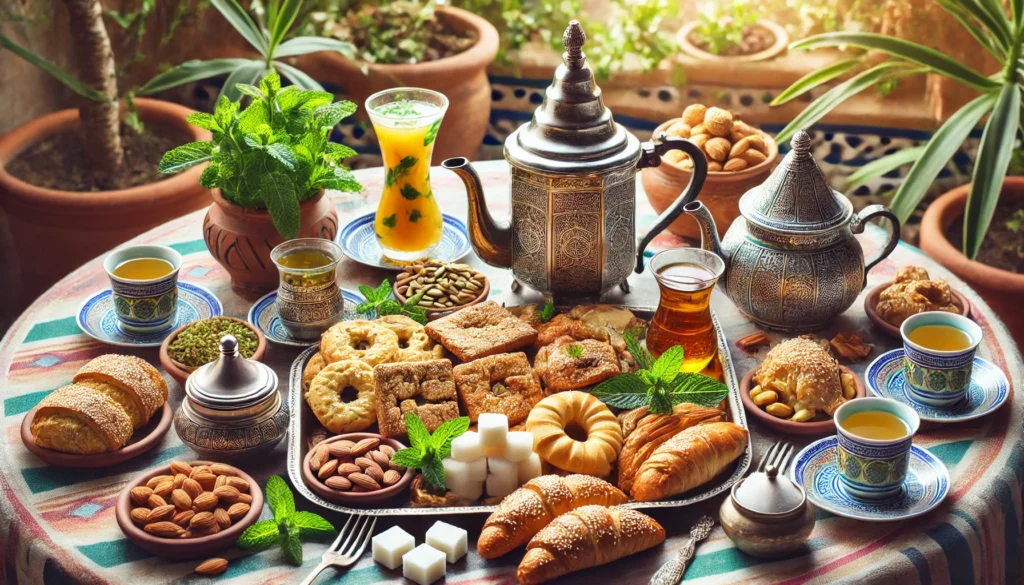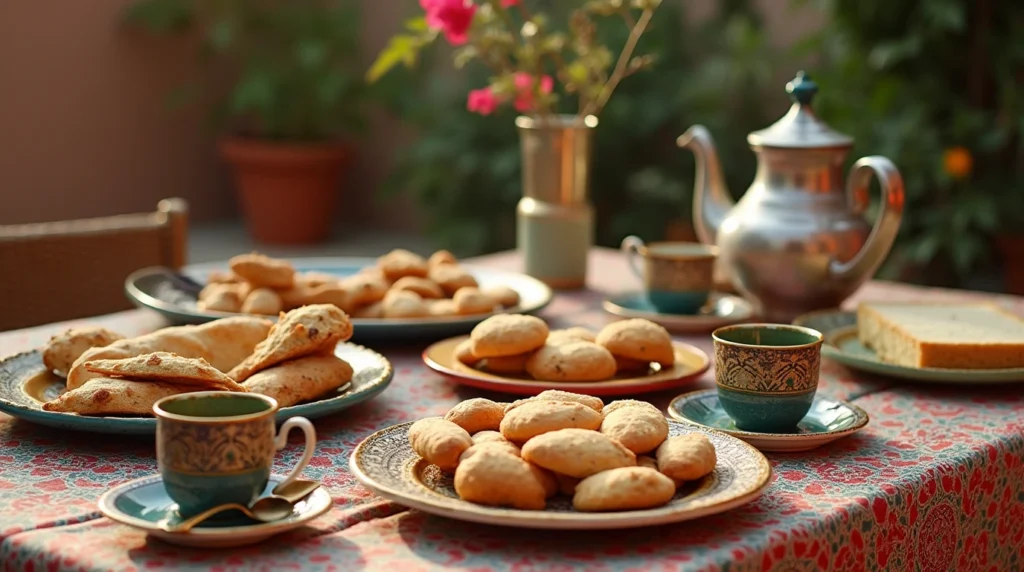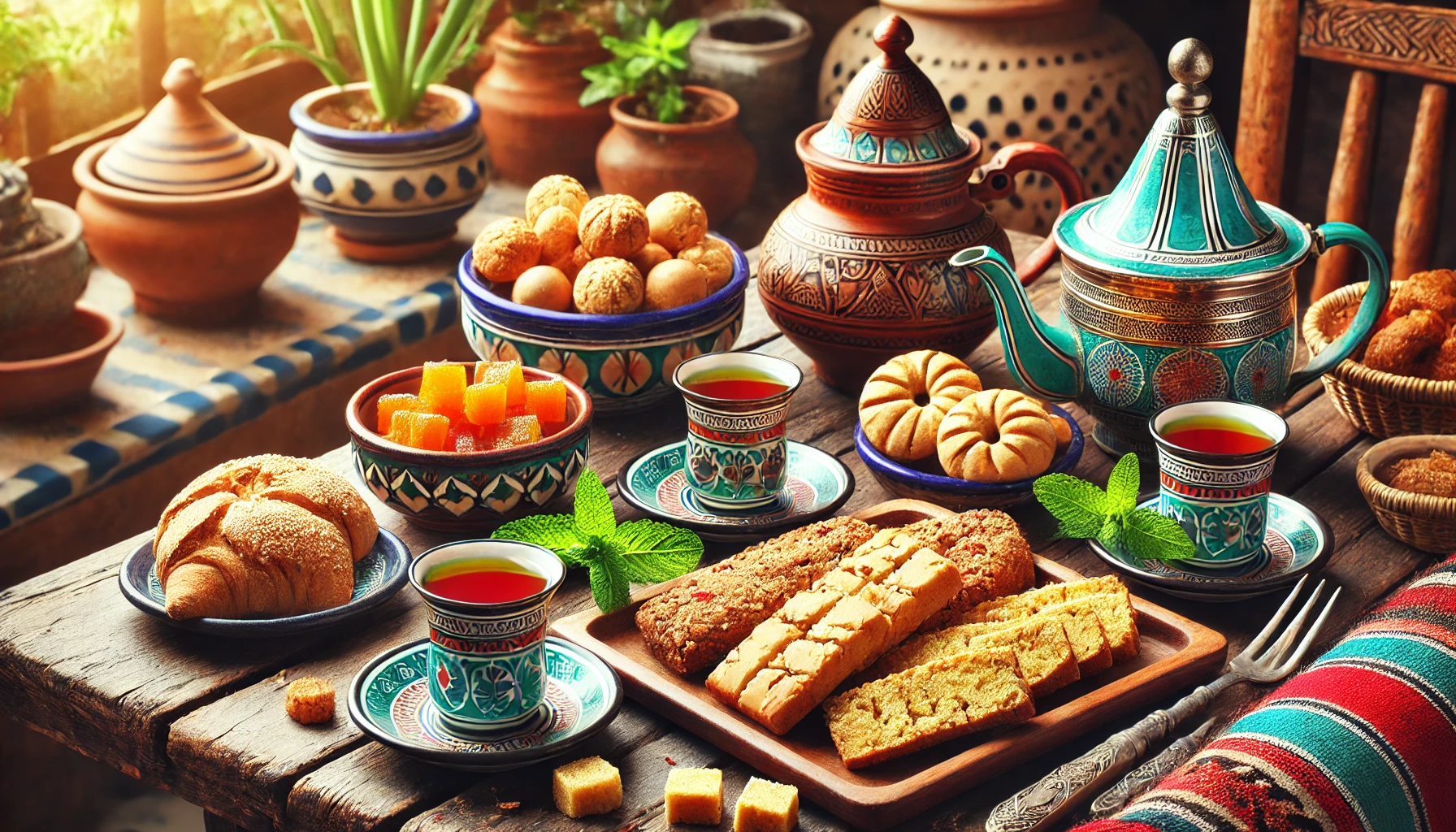A delicious Moroccan breakfast: Fakass and authentic Moroccan tea (1)
Introduction:
A traditional Moroccan breakfast is a delightful experience, combining flavors and textures that cater to both savory and sweet tastes. It’s a harmonious blend of different food types that are not just satisfying but also nourishing. One of the standout dishes in this breakfast is fakkas, a type of Moroccan biscotti, paired perfectly with Moroccan tea. This pairing is more than just food and drink; it reflects the Moroccan way of life and hospitality, which revolves around sharing meals and moments together. Whether you’re in the heart of Morocco or at home, this combination will offer you an authentic taste of the country’s rich culinary heritage.
Moroccan breakfasts often consist of several small dishes, and fakkas and Moroccan tea are two of the most popular items on the table. Fakkas provides a sweet, crunchy treat that complements the warmth and refreshing qualities of Moroccan tea. In this article, we’ll explore the rich history and preparation of fakkas and Moroccan tea, offering you a step-by-step guide to recreate this authentic breakfast in your own kitchen.

Table of Contents:
- Introduction to Moroccan Breakfast
- What is Fakkas?
- The Significance of Moroccan Tea
- Ingredients for Fakkas and Moroccan Tea
- Step-by-Step Guide to Making Fakkas
- How to Brew the Perfect Moroccan Tea
- Tips for an Authentic Moroccan Experience
- FAQ
- Conclusion
1. Introduction to Moroccan Breakfast
A Moroccan breakfast isn’t just about food; it’s an experience that transports you to the heart of Morocco. Rich in flavors, textures, and culture, it brings together a variety of dishes that showcase the diverse ingredients found in Moroccan kitchens. Unlike the typical quick breakfast often seen in many parts of the world, a Moroccan breakfast is meant to be savored slowly, allowing you to enjoy each bite and sip.
For most Moroccans, breakfast is an essential part of their day and often includes a variety of dishes such as harcha, msemen, baghrir, fakkas, and, of course, Moroccan tea. The variety of flavors ,whether sweet, savory, or a combination of both ,reflects the diverse regions of Morocco. One thing that all these breakfasts share is the importance of sharing them with loved ones, making breakfast a social occasion. In the following sections, we’ll delve into fakkas and Moroccan tea, two staple items that should never be missing from a traditional Moroccan breakfast.
2. What is Fakkas?
Fakkas is a traditional Moroccan treat that’s often compared to biscotti, but it has its own unique identity. Fakkas are twice-baked, crunchy biscuits that can be sweet or savory, but the sweet versions are the most common for breakfast. They are typically flavored with almonds, sesame seeds, orange blossom water, and sometimes even aniseed, creating a delightful blend of aromatic flavors.
Fakkas is a versatile treat. While many enjoy it as part of a breakfast spread, it can also be served as a snack with Moroccan tea during the afternoon. Fakkas is especially popular during the colder months, as the crunchiness provides a comforting texture that pairs perfectly with the warmth of tea. In Morocco, each family may have their own variation of fakkas, making it a dish full of regional and familial significance.
3. The Significance of Moroccan Tea
Moroccan tea, known as atay in Arabic, is an integral part of Moroccan culture. It’s not just a drink; it represents hospitality, friendship, and warmth. Offering Moroccan tea to guests is a custom that has been passed down for generations. This tea is typically made with green tea leaves, fresh mint, and sugar, creating a refreshing and fragrant beverage that perfectly complements the crispy texture of fakkas.
The process of making Moroccan tea is an art in itself. The tea is prepared in a unique teapot, and pouring it from a height into small glasses plays a key role in achieving the ideal flavor and a frothy surface. The mint is often added generously to enhance the aroma, while sugar is used to make the tea sweet, which is a hallmark of Moroccan tea. The ritual of preparing and serving Moroccan tea is often seen as a form of bonding, bringing people together for conversation, relaxation, and hospitality.

4. Ingredients for Fakkas and Moroccan Tea
| Fakkas Ingredients | Moroccan Tea Ingredients |
|---|---|
| 2 cups of all-purpose flour | 2 teaspoons green tea leaves |
| 1 cup sugar | 1 bunch of fresh mint |
| 2 eggs | 4 tablespoons sugar |
| Half a cup of almonds | 4 cups of water |
| 1 teaspoon vanilla | |
| 1 tablespoon sesame seeds | |
| 1 teaspoon baking powder |
5. Step-by-Step Guide to Making Fakkas
- Step 1: Set your oven to 180°C (350°F) to preheat. Line a baking sheet with parchment paper to prevent the fakkas from sticking.
- Step 2: In a large mixing bowl, combine the flour, sugar, baking powder, and a pinch of salt. Mix thoroughly.
- Step 3:In a separate bowl, beat the eggs and vanilla together. Gradually incorporate this mixture into the dry ingredients, stirring until a dough begins to form.
- Step 4: Mix in the almonds, sesame seeds, and orange blossom water, kneading the dough until it forms a smooth, consistent texture.
- Step 5: Divide the dough into two portions. Shape each portion into a log, about 2 inches wide and 10 inches long.
- Step 6: Bake for 25 to 30 minutes, or until it turns golden brown.
The dough should firm up and develop a light brown crust. - Step 7: Let the baked logs cool slightly before slicing them into 1-inch thick pieces.
- Step 8: Return the slices to the oven for an additional 10-15 minutes to crisp them up. This second baking process gives fakkas their signature crunch.
6. How to Brew the Perfect Moroccan Tea
- Step 1: Boil water in a kettle. Warm your teapot by rinsing it with hot water.
- Step 2: Add 2 teaspoons of green tea leaves to the teapot. Pour a little boiling water into the teapot, swirl it around, and then discard the water to rinse the tea leaves.
- Step 3: Place a handful of fresh mint into the teapot, then add 4 cups of boiling water.
- Step 4: Stir in 4 tablespoons of sugar (or more, to taste). Traditionally, Moroccan tea is quite sweet, but you can adjust the sweetness according to your preference.
- Step 5: Allow the tea to steep for 5-7 minutes, stirring gently to help dissolve the sugar.
- Step 6: The key to a perfect Moroccan tea is in the pouring technique. Pour the tea into glasses from a height of about 6 inches, which aerates the tea and creates a frothy top.
- Step 7: Serve with extra mint leaves in each glass for added fragrance and flavor.
7. Tips for an Authentic Moroccan Experience
- Pairing with Bread: While fakkas and tea are staples, consider adding some Moroccan bread such as khobz or harcha to your breakfast for a more authentic experience.
- Presentation: Serve Moroccan tea in small glasses rather than cups, and offer it with a side of pastries or fakkas to create a more authentic Moroccan ambiance.
- Sharing: In Moroccan culture, meals and drinks are meant to be shared. When making Moroccan tea, be sure to pour it for your guests and offer fakkas as a gesture of hospitality.

8. FAQ
- What is the best type of tea for making Moroccan tea?
The best tea for Moroccan tea is gunpowder green tea leaves, known for their robust flavor and ability to pair beautifully with mint and sugar. - Can I make Fakkas without almonds?
Yes! You can substitute almonds with other nuts, like walnuts or pistachios, or even leave them out for a simpler version. - How can I adjust the sweetness of Moroccan tea?
Adjust the sugar content of Moroccan tea according to your taste preferences. Traditionally, it’s quite sweet, but you can add more or less sugar based on your personal preference. - Can I prepare Fakkas in advance?
Yes, fakkas can be stored in an airtight container for up to a week, maintaining their crunchy texture.
9. Conclusion: Discovering the World Through Culinary Traditions
Exploring different cultures is a journey of discovery that goes beyond landmarks and landscapes ,food plays a vital role in shaping the essence of every society. Among these vibrant culinary traditions, Moroccan cuisine stands out for its rich history, diverse flavors, and warm hospitality. One of the most iconic representations of this culinary heritage is the traditional Moroccan breakfast, particularly during festive occasions like Eid.
At the heart of this Moroccan breakfast are two beloved staples: fakkas and Moroccan tea. Fakkas, a type of Moroccan biscotti, combines the delicate crunch of almonds and sesame seeds with just the right hint of sweetness, making it a perfect complement to the aromatic mint tea. The ritual of preparing and serving Moroccan tea is more than just making a beverage ,it’s an art form that symbolizes generosity, friendship, and respect. The act of pouring tea from a height into small glasses not only enhances the flavor but also creates a sense of connection between those sharing the table.
During Eid celebrations, the Moroccan breakfast becomes even more significant, as families gather to share special moments over a beautifully set table filled with homemade fakkas, warm msemen, and freshly brewed mint tea. This simple yet meaningful meal reflects the deep-rooted Moroccan values of unity, gratitude, and joy.
By experiencing traditional breakfasts like this, one gains a deeper appreciation for Moroccan culture and, by extension, a greater understanding of how food connects us all. Each dish tells a story, each sip of tea invites warmth, and every bite of fakkas offers a glimpse into the heart of Morocco. For those seeking to broaden their horizons, immersing oneself in the flavors and rituals of different cultures is a remarkable way to foster empathy, curiosity, and global unity. https://www.simplyrecipes.com/christmas-cookie-recipes-8721824 https://www.allrecipes.com/article/brew-the-perfect-cup-of-tea/
In essence, Moroccan breakfast is not just a meal ,it’s an invitation to discover a world rich in tradition, flavor, and heartfelt hospitality. So, next time you find yourself in Morocco or at a Moroccan friend’s table, embrace the opportunity to experience this timeless cultural treasure firsthand. You’ll leave not just with a full stomach, but with a deeper connection to a world beyond borders.
“Have you tried our recipe?”
There are no reviews yet. Be the first one to write one.

